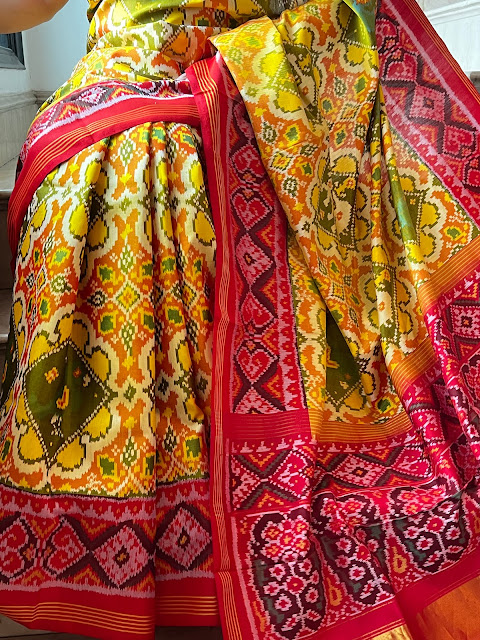Introduction
Sarees have always been a symbol of grace and elegance in
the world of fashion. With their timeless appeal and versatility, sarees are a
favorite choice among women of all ages. One of the most sought-after varieties
of sarees is the semi Patola saree. These sarees are not just a piece of
clothing but a work of art that tells a story of tradition, craftsmanship, and
beauty.
In this blog post, we will delve into the world of semi
Patola sarees, exploring their origins, the intricate weaving process, and the
reasons why they are cherished by saree enthusiasts.
The Origin of Patola Sarees
Patola sarees, which originate from the state of Gujarat in
India, have a rich and ancient history. The word "Patola" is derived
from the Sanskrit word "Pattakulla," which means "a silk
textile." These sarees are known for their double ikat weaving technique,
where both the warp and weft threads are resist-dyed before weaving. This
labor-intensive process results in symmetrical and intricate patterns on both sides
of the fabric, making Patola sarees highly coveted.
Semi Patola Sarees: A Glimpse into Luxury
While pure Patola sarees are exquisite and quite expensive
due to their intricate weaving process, semi Patola sarees offer a more
accessible option without compromising on the charm and quality. These sarees
are characterized by the use of silk or silk-blend fabrics and are adorned with
traditional Patola-inspired designs, but they are not created using the double
ikat technique, making them more affordable.
The Weaving Process
The semi Patola sarees are handwoven by skilled artisans who
have honed their craft over generations. The weaving process involves several
steps:
1. Designing: Skilled artisans create intricate designs on
paper, serving as a blueprint for the saree's pattern.
2. Dyeing: In the case of semi Patola sarees, the warp or
weft threads are resist-dyed, but not both, as in the case of pure Patola
sarees. This process involves meticulously tying and dying specific sections of
the threads to achieve the desired patterns and colors.
3. Weaving: The dyed threads are then woven into the fabric,
with precision and attention to detail. The weaving process can take weeks or
even months, depending on the complexity of the design.
4. Finishing: Once the weaving is complete, the saree
undergoes finishing touches such as border work, pallu design, and edge
stitching to make it ready for the market.
The Timeless Appeal
Semi Patola sarees hold a special place in the hearts of
saree enthusiasts for several reasons:
1. Elegance: These sarees exude elegance and charm, making
them suitable for various occasions, from festive gatherings to formal events.
2. Versatility: Semi Patola sarees can be styled in numerous
ways, and they complement a wide range of accessories, allowing you to create a
personalized and unique look.
3. Heritage: Each semi Patola saree is a piece of cultural
heritage, preserving traditional Indian weaving techniques and designs.
4. Comfort: The soft and lustrous silk fabric used in semi
Patola sarees ensures comfort and ease of wear.
Conclusion
Semi Patola sarees are not just pieces of clothing; they are a testament to the artistry and craftsmanship that has been passed down through generations. These sarees embody the perfect blend of tradition, elegance, and affordability. Whether you are a saree aficionado or a newcomer to the world of Indian fashion, a semi Patola saree is a must-have addition to your collection. Its timeless appeal and cultural significance make it a true masterpiece in the world of fashion. So, the next time you're looking for a saree that blends tradition and style, consider the enchanting elegance of a semi Patola saree.
Your queries are best answered through WhatsApp
We post our products first to our privè broadcast list on WhatsApp. The inside circle gets preview to our exclusive collection with prices. MESSAGE US TO BE ADDED
#semipatola #semipatolsaree #patanpatolasaree




No comments:
Post a Comment